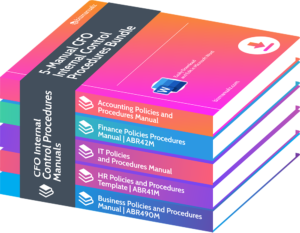What Should a CFO Know About Financial Data Security?

As a CFO, you are responsible for managing your company’s financial data and ensuring its security. In today’s digital age, data breaches are becoming increasingly common and can have serious consequences for businesses. In this article, we will discuss the importance of financial data security and what you, as a CFO, need to know in order to protect your company’s sensitive information. What should a CFO know about financial data security?
Why is Financial Data Security Important for CFOs?
CFOs must prioritize financial data security for several crucial reasons. Firstly, they are responsible for handling sensitive financial information, including company finances, employee salaries, and customer financial data.
Any breach of this information can result in financial loss, damage to reputation, and legal consequences. Secondly, CFOs must ensure compliance with data protection regulations such as GDPR or CCPA to avoid facing substantial fines.
Finally, financial data breaches can cause significant disruptions to business operations, resulting in financial and operational challenges. Therefore, it is essential for CFOs to prioritize financial data security to safeguard their organization’s financial well-being, reputation, and legal standing.
What are the Consequences of a Data Breach?
A data breach can have severe consequences for organizations, including financial losses, damage to their reputation, and potential legal and regulatory penalties.
The exposure of sensitive financial data can result in identity theft, fraud, and unauthorized access to bank accounts. This can lead to a loss of customer trust and a decline in business, potentially resulting in lawsuits. Companies may also face fines for non-compliance with data protection laws.
In addition, organizations may need to invest significant resources in remediation efforts, such as implementing stronger security measures and offering identity theft protection services to affected individuals. As such, it is crucial for CFOs to prioritize data security in order to mitigate the potential consequences of a data breach.
What are the Common Threats to Financial Data Security?
As a CFO, it is crucial to be well-informed about potential threats to financial data security. In this section, we will discuss the common threats that companies face when it comes to safeguarding their financial data.
From insider threats to cyber attacks, we will uncover the various ways in which sensitive financial information can be compromised. By understanding these threats, CFOs can better prepare and protect their organizations from potential breaches. So, let’s dive into the world of financial data security threats and how they can impact businesses.
1. Insider Threats
Insider threats pose a significant risk to the security of financial data. To mitigate this risk, CFOs should take the following steps:
- Implement strict access controls: Limit access to sensitive financial data only to authorized personnel.
- Monitor employee behavior: Continuously monitor and analyze employees’ activities to identify any suspicious or unauthorized actions related to insider threats.
- Provide regular training and awareness programs: Educate employees about the importance of data security and the potential risks associated with malicious insider activities.
- Enforce strong password policies: Require employees to use complex passwords and regularly change them to prevent insider threats.
- Implement data loss prevention measures: Use technology solutions to monitor and prevent the unauthorized transfer or leakage of sensitive financial data caused by insider threats.
2. Phishing and Social Engineering Attacks
Phishing and social engineering attacks are two common threats that CFOs must be vigilant of in order to maintain financial data security. To safeguard against these attacks, CFOs should take the following measures:
- Educate employees on how to recognize and avoid phishing attempts.
- Implement email filters and firewalls to block suspicious emails and websites.
- Ensure that sensitive information is never shared through email or over the phone.
- Regularly update and patch software to prevent vulnerabilities that can be exploited by attackers.
- Utilize strong authentication methods, such as two-factor authentication, to add an additional layer of security.
By following these steps, CFOs can minimize the risk of falling prey to phishing and social engineering attacks and safeguard their financial data.
3. Malware and Ransomware Attacks
Malware and ransomware attacks pose significant threats to financial data security. In order to protect their organization from these attacks, CFOs should take preventive measures. Here are some steps that can be taken to ensure data security:
- Install robust antivirus and anti-malware software to detect and prevent malware infections.
- Regularly update software and operating systems to patch vulnerabilities that can be exploited by malware.
- Train employees on how to recognize and avoid phishing emails or suspicious attachments that may contain malware.
- Enable automatic backups of critical financial data to ensure it is not lost or held hostage by ransomware.
- Create strong and unique passwords for all accounts and implement two-factor authentication for added security.
- Segment networks to limit the spread of malware and ransomware if an infection occurs.
- Regularly monitor and analyze network traffic for any signs of malware activity.
- Develop an incident response plan to quickly address and mitigate the impact of malware or ransomware attacks.
How Can CFOs Protect Financial Data?

IT Security Policies
As a CFO, it is crucial to understand the importance of protecting financial data from potential cyber threats. In this section, we will discuss the various measures that can be taken to safeguard sensitive financial information.
From implementing strong password policies to conducting regular security audits, there are several steps that CFOs can take to ensure the security of financial data. Let’s dive into each of these measures and explore how they can help protect valuable financial information.
1. Implement Strong Password Policies
Implementing strong password policies is crucial for ensuring the security of financial data. Here are some steps to follow:
- Require complex passwords with a minimum length and a combination of uppercase and lowercase letters, numbers, and special characters.
- Encourage users to regularly change their passwords and avoid reusing them for multiple accounts.
- Implement account lockouts after multiple failed login attempts to prevent brute force attacks.
- Enable two-factor authentication to add an extra layer of security.
- Regularly educate employees on the importance of strong passwords and provide tips for creating secure passwords.
Fact: Did you know that over 80% of data breaches are caused by weak or stolen passwords?
2. Use Multi-Factor Authentication
- Incorporate multi-factor authentication (MFA) as an additional layer of security.
- Select a reliable MFA solution that supports multiple authentication methods.
- Mandate users to provide at least two factors to gain access to financial data.
- These factors can include something the user knows (password), something the user has (security token), or something the user is (biometric data).
- Ensure that MFA is enabled for all users with access to financial data.
- Regularly review and update the MFA settings to strengthen security.
- Educate employees on the proper and secure use of MFA.
- Monitor MFA logs and investigate any suspicious activity.
3. Regularly Update and Patch Systems
- Consistently check for software updates and patches provided by the vendors.
- Install updates promptly to ensure your systems have the latest security fixes.
- Enable automatic updates whenever possible to ensure timely installation.
- Regularly review system logs and security reports to identify vulnerabilities.
- Implement a robust change management process to track and apply updates.
Pro-tip: It’s crucial to frequently update and patch systems to protect against known vulnerabilities and exploit attempts. By staying up-to-date, CFOs can significantly reduce the risk of data breaches and ensure the security of financial information.
4. Conduct Regular Security Audits
Conducting regular security audits is crucial for maintaining the integrity of financial data. Here are the steps to ensure comprehensive security assessments:
- Identify the scope of the audit, including systems, processes, and data.
- Perform vulnerability scanning to identify potential weaknesses.
- Penetration testing to simulate real-world attacks and assess defenses.
- Review system logs and monitor for suspicious activities.
- Assess physical security measures, such as access controls and surveillance systems.
- Review security policies and procedures to ensure compliance.
- Evaluate employee awareness and training programs.
- Document findings, prioritize remediation efforts, and create an action plan.
- Regularly repeat the audit process to address new vulnerabilities and changes.
What are the Best Practices for Financial Data Security?
As a Chief Financial Officer (CFO), it is crucial to prioritize the security of your company’s financial data. In this section, we will discuss the best practices for ensuring the protection of sensitive financial information.
These practices include limiting access to data, encrypting data in transit and at rest, and providing security training for employees. By implementing these measures, CFOs can safeguard their company’s financial data from potential cyber threats.
1. Limit Access to Sensitive Data
Limiting access to sensitive financial data is crucial for ensuring data security and protecting against unauthorized access or misuse.
- Implement strict access controls: Only grant access to sensitive data to authorized personnel who need it for their job responsibilities.
- Create user roles and permissions: Assign specific access levels to different individuals based on their roles and responsibilities.
- Use strong authentication methods: Implement strong passwords, two-factor authentication, or biometric authentication to verify the identity of users.
- Regularly review and update access permissions: Regularly review and update access permissions to ensure that only approved individuals have access to sensitive data.
- Monitor access logs: Keep track of who accesses sensitive data and when, and investigate any suspicious activity.
Fact: According to a study by IBM, the average cost of a data breach in the financial industry was $5.86 million in 2020.
2. Encrypt Data in Transit and at Rest
Encrypting data is essential for safeguarding financial information from unauthorized access. To ensure proper encryption, follow these steps:
- Utilize SSL/TLS protocols to encrypt data while transmitting it over networks.
- Implement secure file transfer protocols (SFTP) to encrypt data during file transfers.
- Use robust encryption algorithms to encrypt data when storing it on servers or databases.
- Employ encryption tools or software to encrypt sensitive files and folders on local devices.
- Properly manage and protect encryption keys to maintain security.
3. Train Employees on Security Awareness
To ensure strong financial data security, CFOs should prioritize training employees on security awareness. This can be achieved by following these steps:
- Educate employees on the importance of data security and the potential consequences of a breach.
- Provide training on identifying and reporting phishing and social engineering attacks.
- Instruct employees on safe browsing habits and the risks associated with downloading suspicious files or visiting unsecure websites.
- Teach employees about the dangers of malware and ransomware attacks, including how to recognize and report any suspicious activity.
- Encourage employees to regularly update their passwords and use strong, unique passwords for each account.
- Conduct regular security awareness workshops or seminars to keep employees up to date on evolving security threats and best practices, including training on security awareness.
Frequently Asked Questions

What should a CFO know about financial data security?
A CFO should have a thorough understanding of the importance of financial data security and the potential risks associated with it.
Why is financial data security important for a CFO?
Financial data security is crucial for a CFO as it protects sensitive financial information from cyber threats, ensuring the company’s financial stability and reputation.
What are some common threats to financial data security?
Some common threats to financial data security include cyber attacks, data breaches, insider threats, and physical theft or loss of devices containing financial data.
How can a CFO ensure financial data security?
A CFO can ensure financial data security by implementing strict security measures, regularly monitoring and updating systems, and providing training to employees on cybersecurity best practices.
What are the consequences of a financial data breach?
A financial data breach can result in significant financial losses, damage to the company’s reputation, legal repercussions, and loss of customer trust.
What should a CFO do if a financial data breach occurs?
If a financial data breach occurs, a CFO should immediately take action to contain the breach, notify relevant parties, and work towards implementing stronger security measures to prevent future breaches.
















Leave a Reply